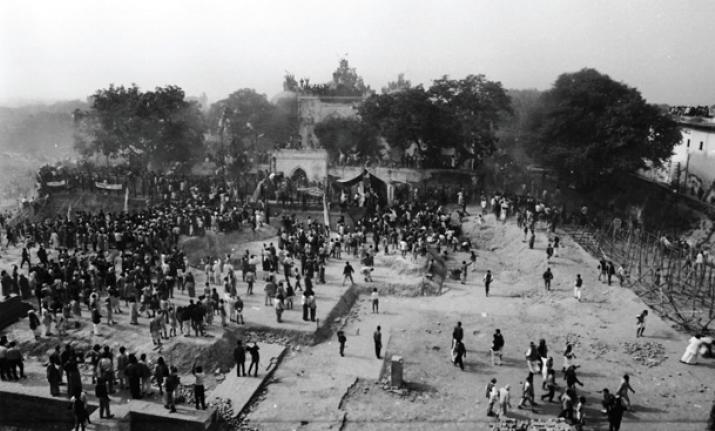News Analysis |
6th December 2017 marked the 25th anniversary of the demolition of Babri Mosque in India. The quarter century old event was a significant point in the history of the South Asian giant as it shaped the social fabric of the nation and marked the rise of the far right Hindutva thought to the mainstream.
On 6th December 1992, a large crowd of Hindu Kar Sevaks (activists) demolished the 16th-century Babri Mosque in the city of Ayodhya, in Uttar Pradesh. The demolition occurred after a political rally at the site turned violent.
In Hindu mythology, the city of Ayodhya is the birthplace of Lord Rama. In the 16th century a Mughal general, Mir Baqi, had built a mosque, known as the Babri Masjid, at a site considered to be the birthplace of Lord Rama, or Ram Janmabhoomi.
On the 25th anniversary of the demolition of the Babri Masjid, history waits with baited breath as the Hindutva government in power.
In the 1980s, the Vishva Hindu Parishad (VHP) began a campaign for the construction of a temple dedicated to Rama at the site, with the Bharatiya Janata Party (BJP) as its political voice. Several rallies and marches were held as a part of this movement, including the Ram Rath Yatra led by L. K. Advani.
The Ram Rath Yatra was a political-religious march from September to October 1990, organized by the Bharatiya Janata Party (BJP) and its Sangh Parivar affiliates, and led by the then-BJP-president L. K. Advani. The purpose of the yatra was to support the agitation of the Vishwa Hindu Parishad and its Sangh Parivar affiliates to erect a temple to the Hindu deity Rama on the site of Babri Masjid.
Read more: Babri Masjid case: BJP leaders charged for criminal conspiracy
On the ill-fated day, the VHP and the BJP organised a rally at the site involving 150,000 volunteers, known as kar sevaks. The rally turned violent, and the crowd overwhelmed security forces and tore down the mosque. A subsequent inquiry into the incident found 68 people responsible for the demolition, including several leaders of the BJP and the VHP. The demolition also resulted in several months of intercommunal rioting between India’s Hindu and Muslim communities, causing the death of at least 2,000 people.
In the 1980s, the Vishva Hindu Parishad (VHP) began a campaign for the construction of a temple dedicated to Rama at the site, with the Bharatiya Janata Party (BJP) as its political voice.
The destruction of Babri Mosque, as well as the destruction of numerous others that day, sparked inter religious outrage around the country, provoking several months of inter-communal rioting in which Hindus and Muslims attacked one another, burning and looting homes, shops and places of worship. Several of the BJP leaders were taken into custody, and the VHP was briefly banned by the government. Despite this, the ensuing riots spread to cities like Mumbai, Surat, Ahmedabad, Kanpur, Delhi, Bhopal and several others, eventually resulting in over 2000 deaths, mainly Muslim.
Read more: BJP condemns Tipu Sultan’s birth anniversary celebrations
The Mumbai Riots alone, which occurred in December 1992 and January 1993 and which the Shiv Sena played a big part in organising, caused the death of around 900 people, and estimated property damage of around 9,000 crore ($3.6 billion). The demolition and the ensuing riots were among the major factors behind the 1993 Mumbai bombings and many successive riots in the coming decade.
Firebrand political commentator and editor of ‘Thuglak’, Cho Ramaswamy, wrote an editorial condemning the BJP, RSS, VHP, Bajrang Dal and the Sangh Parivar. He stated that “Just for the sake of a few votes in the name of Ram Temple, BJP has done a huge damage to the nation.”
A subsequent inquiry into the incident found 68 people responsible for the demolition, including several leaders of the BJP and the VHP.
To this day, the Babri masjid demolition holds a significant place in social discourse of India. Targeting the BJP on the anniversary of Babri mosque demolition, West Bengal chief minister Mamata Banerjee on Wednesday said divisive politics that began 25 years ago is still continuing and religion cannot be an election issue or the agenda of a government.
She also hit out at the BJP over its accusations against her government of pursuing politics of appeasement and said that West Bengal has nearly 31 percent Muslim population.
Read more: Yogi Adityanath responds as war of words over Taj Mahal escalates
“As a chief minister of the state, it is my duty to look after them. If working for the people is appeasement, I will continue to do it,” she said while at a ‘Samhati divas’ rally here to mark the 25th anniversary of the demolition of Babri mosque in Ayodhya.
On the 25th anniversary of the demolition of the Babri Masjid, history waits with baited breath as the Hindutva government in power, a party that rose from the ashes of Babri Masjid, is yet to show whether it would lead India on a pluralistic oath or fulfill its ambition of creating a Hindu “Rashtra” on a mountain of skulls.














